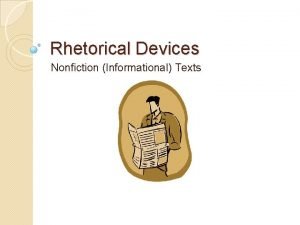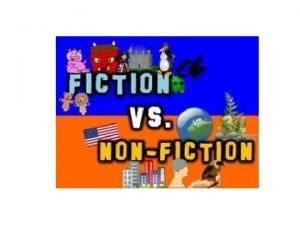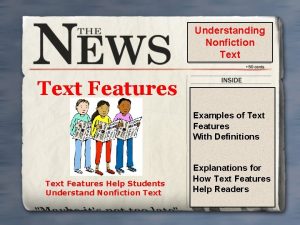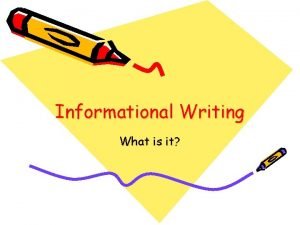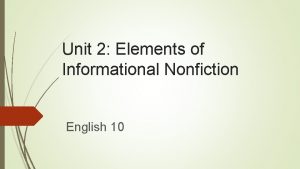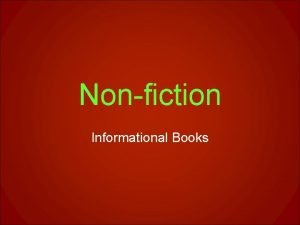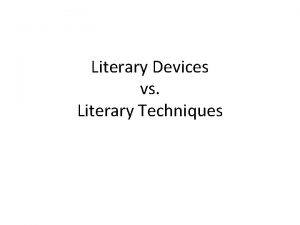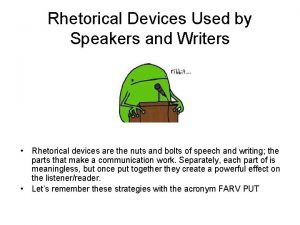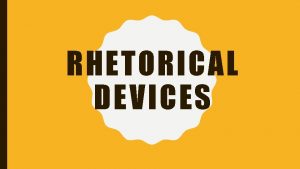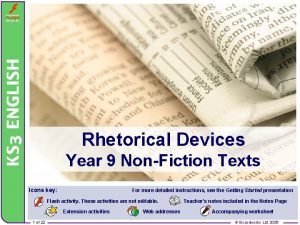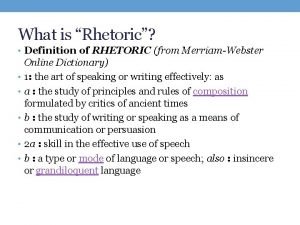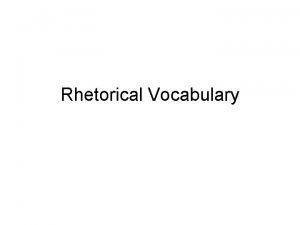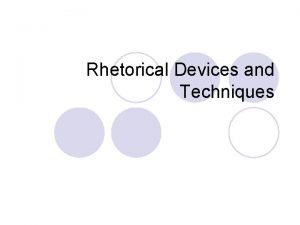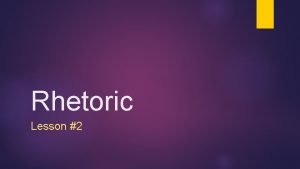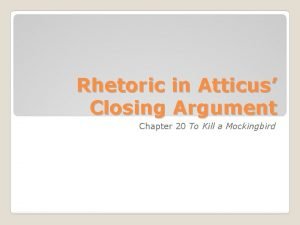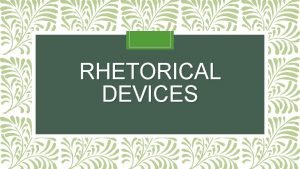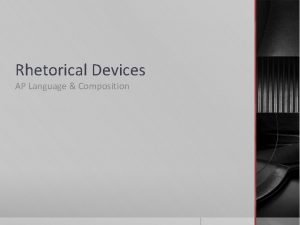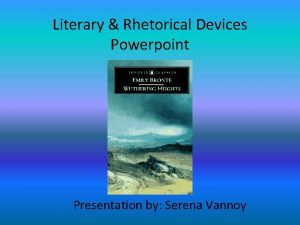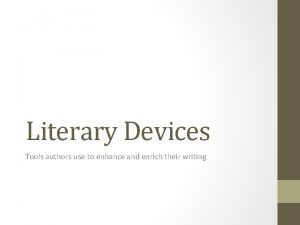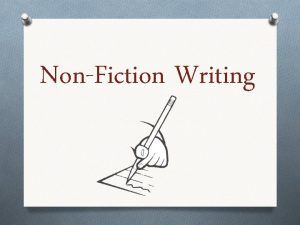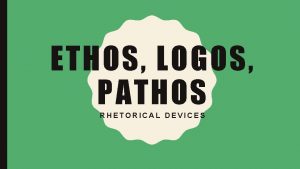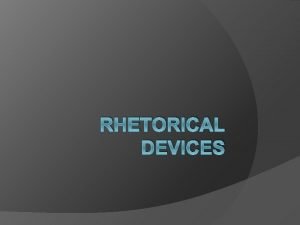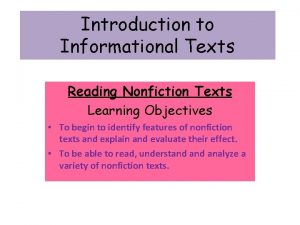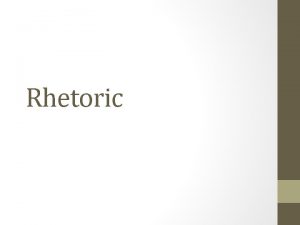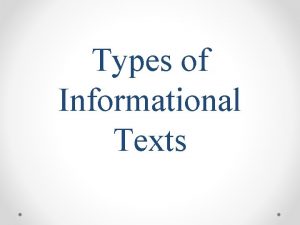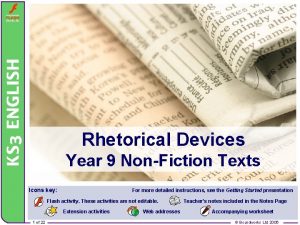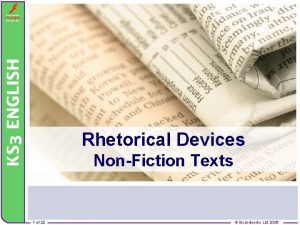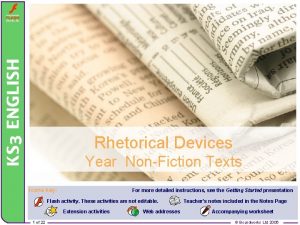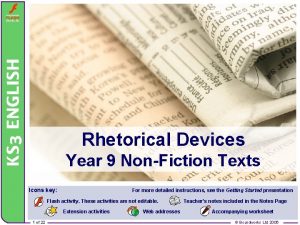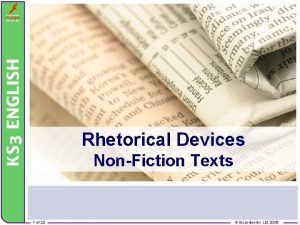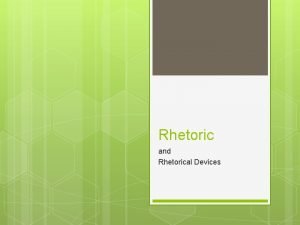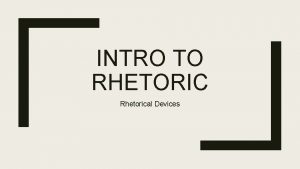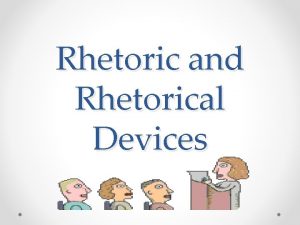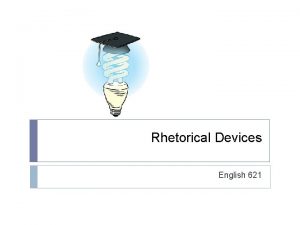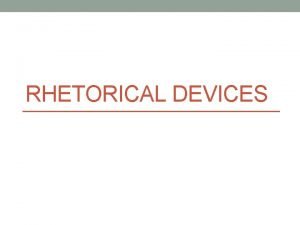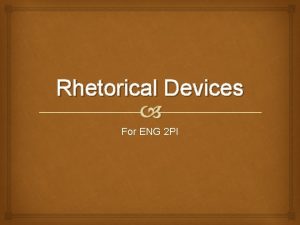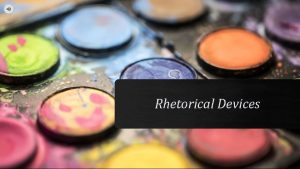Rhetorical Devices Nonfiction Informational Texts What is RHETORIC
























- Slides: 24

Rhetorical Devices Nonfiction (Informational) Texts

What is RHETORIC? Rhetoric is the art of using language persuasively and effectively.

Rhetorical Devices We use rhetorical devices to write or speak persuasively -- to ARGUE effectively. Rhetorical Devices include: 1. Pathos, Ethos, and Logos 2. Repetition 3. Parallelism 4. Alliteration 5. Figurative Language (ex. allusions, similes, metaphors, imagery) 6. Rhetorical questions

Pathos �Appeal through EMOTION ◦ Examples: �Draw from spirituality or religious traditions �Stories or testimonials �Personal stories (anecdotes) �Imagery (sensory details) �Empathy or compassion �Words to stir up emotion �Details from subjective reporting (bias)

Example of Pathos

Ethos �Appeal through ETHICS (right/wrong) & CREDIBILITY (believability) ◦ Examples: �Author’s believability, qualifications, character, relevant biographical information �Use of expert scholars �Accurate citation of sources (giving credit where credit is due) �Use of language and discipline �Humility (author is NOT arrogant) �Avoids generalizations OR sweeping statements �Example: will not say “everyone is doing this”

Example of Ethos

Logos �Appeal through LOGIC, RATIONALITY, CRITICAL REASONING the mind ◦ Examples: �Facts and Statistics �Draw from philosophy and logic �“If, then…” statements �Definitions of terms �Explanation of ideas �Cause and Effect �Details from objective reporting (neutral) �Reason and Explanations

Example of Logos

Repetition �Repeating important words or Tony Blair said that his main priority as Prime Minister phrases can would be: indicate to the reader that they are important. They help to make the writing more persuasive and Education, make certain words Education or phrases stick in the reader’s head.

Parallelism � Two or more words, phrases, or clauses that are similar in length and grammatical form � Used often in speeches repetition and parallelism are combined "Today's students can put dope in their veins or hope in their brains. If they can conceive it and believe it, they can achieve it. They must know it is not their aptitude but their attitude that will determine their altitude. “ (Jesse Jackson)

Parallel or Not Parallel: The housekeeper looked inside the drawers, on top of the bookcase, and under the bed. NOT Parallel: The maid looked inside the drawer, the bookcase, and under the bed.

Parallel or Not Parallel? �We left for vacation without our credit cards, money, and our clothes. �How can we correct this sentence?

Alliteration �Alliteration is where two or more words begin with the same letter. Sally sells seashells by the seashore…

What is an ALLUSION? �An expression designed to call something to mind without mentioning it explicitly; an indirect or passing reference.

What does the glass slipper allude to?

What does the number 23 allude to?

Figurative Language: Allusions “There's a coincidence today. On this day three hundred and ninety years ago, the great explorer Sir Francis Drake died aboard ship off the coast of Panama. In his lifetime the great frontiers were the oceans, and a historian later said, ‘He lived by the sea, died on it, and was buried in it. ’ Well, today, we can say of the “Challenger” crew: Their dedication was, like Drake's, complete. ” Ronald Reagan- The Space Shuttle "Challenger" Tragedy Address

Figurative Language: Metaphor �“The energy, the faith, the devotion which we bring to this endeavor will light our country and all who serve it. And the glow from that fire can truly light the world. ” –JFK Inaugural Address

Figurative language: Simile �"Life is like an onion: You peel it off one layer at a time, and sometimes you weep. “ � (Carl Sandburg)

Imagery �Visually descriptive imaginary pictures using words �Use of Sensory details ◦ Sight, Sound, Smell, Taste, Touch

Rhetorical Questions

Rhetorical Devices � There are lots of other types of rhetorical devices that writers use to write effective arguments and to persuade their audiences to their PERSPECTIVE…but these are the ones you will need to know and be able to identify and analyze. �Pathos, Ethos, Logos �Repetition �Parallelism �Alliteration �Figurative language (allusions, metaphors, similes, imagery) �Rhetorical questions

Why author’s write! (Author’s Purpose) �To explain something �To persuade you �To amuse you �To give you information �To entertain you �To shock you �To make you feel strongly about something
 Retorical device
Retorical device Summarizing nonfiction
Summarizing nonfiction Nonfiction text examples
Nonfiction text examples How do informational and explanatory texts differ?
How do informational and explanatory texts differ? Example of inform text
Example of inform text Comparing informational texts
Comparing informational texts Elements of informational text
Elements of informational text Informational nonfiction books
Informational nonfiction books What are literary elements
What are literary elements Rhetoric literary devices
Rhetoric literary devices Rhetoric literary devices
Rhetoric literary devices Caesura in beowulf with line numbers
Caesura in beowulf with line numbers Repetition rhetorical definition
Repetition rhetorical definition Rhetorical devices non fictional text
Rhetorical devices non fictional text Metaphor in fahrenheit 451
Metaphor in fahrenheit 451 Rhetoric definition
Rhetoric definition Foldable vocabulary
Foldable vocabulary Pleonasml
Pleonasml Rhetorical choice
Rhetorical choice Rhetorical question in atticus closing argument
Rhetorical question in atticus closing argument Rhetorical devices literature
Rhetorical devices literature Is symbolism a rhetorical device
Is symbolism a rhetorical device Epistrophe examples
Epistrophe examples Rhetorical devices powerpoint
Rhetorical devices powerpoint What literary device
What literary device
